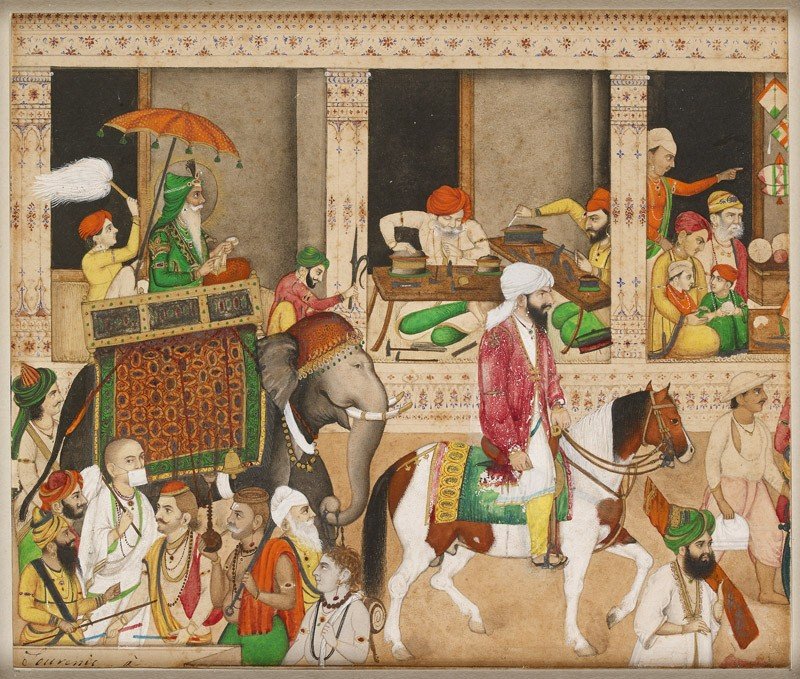Dost Muhammad led a large army towards Peshawar. He gave the slogan of a crusade against the Sikhs and also sought the help of the chiefs of Kunduz, Qandhar, Derajat, Bahawalpur, etc., but received cold response as none wanted to risk his position against Ranjit Singh. The English were also approached for help but Dost Muhammad had to fight single-handed and lost Peshawar to the Sikhs.
No doubt, the occupation of Kabul by the Lahore Durbar forces was within their reach but Ranjit Singh never wanted it for the simple reason that he did not like to be always amidst warfare with the Afghans. He was keen to deliver the blessings of peace and calm to his subjects which could never be conferred on them in case his forces crossed the Khyber Pass. Ranjit Singh’s march into Kabul would have been branded as a naked aggression and he was also not sure of the role of the British in the eventuality of such an invasion.
In the early stages Ranjit Singh wanted to keep himself away from having the direct control of the Afghans or the tribesmen. Therefore, he kept the North West Frontier tribes and the Peshawar province under the local chiefs. But they did not prove strong, efficient and true to their salt, being indolent, shifty and undependable. The Maharaja also did not very much trust them. His Afghan governors of Peshawar, Jahandad Khan, Yar Muhammad Khan, Sultan Muhammad Khan and the Barakzai Sardars proved weak and unreliable. The Maharaja had chosen this course to prevent the flaring up of the Afghan’s emotional association with their land and their national feelings. He was keen to mellow down their antagonistic and irreconcilable behaviour and their open insubordination to the Sikh authority.
Ranjit Singh’s North West Frontier policy yielded historic results. The Afghans could not dare to invade from beyond the Indus during Ranjit Singh’s reign.
In fact, the Maharaja was not so much swayed by considerations of territorial gains as by bis keen desire to have a scientific North West Frontier — a frontier that would not, at any point of time, pose any threat to the security of the Sikh kingdom.
From the critical analysis of the contemporary, semi-contemporary and modern writers regarding the Maharaja’s policy towards the British the following categories of views emerge.
- He was convinced that his friendship with the English should best serve his interests.
- ‘He could never show courage of statesmanship.’ ‘He looked pathetic, helpless and inert.’
- He was convinced of the superior might of the British and he was awfully afraid of them.
- He was a great statesman and knew his limitations.
He adopted conciliatory policy toward the British as he understood the hard realities of the situation. His policy was not based on the fear of the British or cowardice. ccording to Fauja Singh, the Anglo-Sikh relations under Ranjit Singh do not seem to lend support to the views conventionally admitted. It would be unjust to the Maharaja to say that he acted pusillanimously or unwisely in his dealings with the British. The views which attribute lack of courage or lack of statesmanship or Anglo-phobia to him seem to be quite unwarranted.
Undoubtedly, he considered the British as a superior power, more efficient, better organised and commanding greater resources but that does not necessarily mean that he was mortally afraid of them. Similarly, the fact that his resources were smaller than those of the British does not essentially establish that he lacked the capacity or power to confront them in the battle-field. The Maharaja had raised and trained the Khalsa army in such a way as to be rated equal to the army of the East India Company. And also, there is not much justification in saying that the Maharaja had taken such a view of his friendship with the British as to allow his attachment to them to outweigh all other considerations. Diplomatic statements made on formal occasions cannot be taken as a true index to the inner working of a statesman’s mind. 188 When the British friendship served his interests he maintained and honoured it. When this friendship was no more helpful to him there was a change in the tone and temper of the Lahore chief as noticed by Captain Wade in November 1837. The Maharaja was feeling uneasy about the British manoeuvres in Sind and Afghanistan. From 1836 onwards, he adopted a friendly attitude towards Nepal which was bitterly anti-British at that time.
From 1827 onwards, the Maharaja had lot of troubles from the side of the north-west frontier. Dost Muhammad wanted to capture Peshawar by force. So, under these circumstances, if the Maharaja had to take a decision regarding the British he must keep in mind the situation in the north-west of his kingdom. “Whether it was Ferozepur or Shikarpur or the Navigation Treaty or the signing of the Tripartite Treaty he had to make his decisions in full consciousness of the fact that he would surely be stabbed in the back in case he chose to go to war with the British. In such a case while his success against the British would be problematical, his loss of the Peshawar region to the Afghans was something which could not be avoided.” 189 So, to be able to fight against the British Ranjit Singh must come to terms with Dost Muhammad and that was not possible without surrendering Peshawar to him and the surrender of Peshawar meant virtually losing the whole of the trans-Indus Afghan belt. Then, the Afghans could also think of crossing Indus in a bid to make territorial gains from the Maharaja’s kingdom. By fighting two enemies at the same time, that is, the British on the eastern front and the Afghans on the western front, Ranjit Singh could not risk the very existence of his kingdom. Thus, Ranjit Singh had to deal with the British pressures under extremely difficult circumstances and the policy he adopted in respect of the British was, undoubtedly, the best-suited and the wisest one and at any stage of his life the reversal of this policy would have, in all probability, led to the liquidation of his kingdom carved out so diligently and strenuously.
References :-
- History of the Sikh Misls Book.


